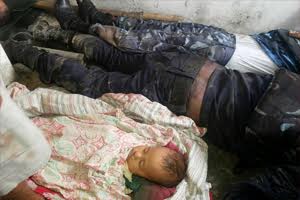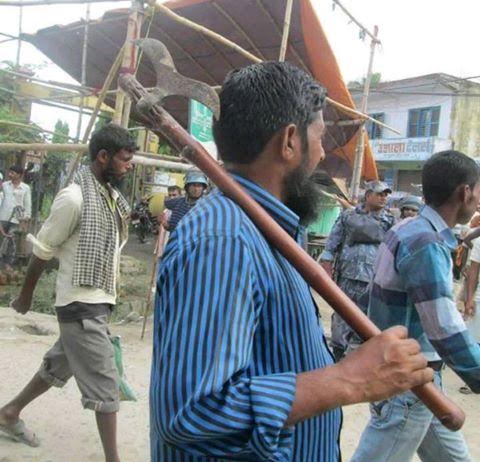The mob lynching of eight policemen and a two-year-old child during clashes between protestors and the police on August 24 in Tikapur, Kailali District, has left many stunned.
Some police officers were burnt alive after being stabbed with home made weapons. The protesters (majority Tharu) showed no mercy to the officers, who had been left pleading for their lives. Mere condemnation of this criminal rage is insufficient, and will not help forge the path of justice and peace that is needed for Tikapur and Nepal as a whole.
 The immediate details are still unclear, but reports suggest that the Nepal Police were attempting to enforce a prohibition against demonstrations imposed by the local administration. To date, no independent investigation has been conducted in relation to the incident, and access to the area by human rights defenders is limited due to continuing risks and security restrictions. There is also lack of clarity about how the two-year-old child was killed, as well as the precise sequence of events that led to the deaths on August 24.
The immediate details are still unclear, but reports suggest that the Nepal Police were attempting to enforce a prohibition against demonstrations imposed by the local administration. To date, no independent investigation has been conducted in relation to the incident, and access to the area by human rights defenders is limited due to continuing risks and security restrictions. There is also lack of clarity about how the two-year-old child was killed, as well as the precise sequence of events that led to the deaths on August 24.
The two-year old child who died was Tek Bahadur Saud, the son of a police officer. The five dead Nepal Police officials are Senior Superintendent of Police (SSP) Laxman Neupane, Inspectors Balram Bista and Keshav Bohara, Constables Laxman Khadka and Lokendra Chandra. Also killed in the violence were Armed Police Force (APF) Head Constables Rambihari Chaudhary and Lalit Saud. Additionally, Police Constable Janak Negi died on August 27 in hospital. More than 40 members of the security forces are reported injured, with wounds from spears and other weapons.
It is important to take into account earlier indications of escalating communal violence in relation to the national political process, in order to uncover the roots of the violence on August 24. The death of the policemen and child followed several days of communal conflict. This conflict was ignited by the decision of the political parties in Kathmandu on 8 August 2015, to combine Kanchanpur and Kailali districts into a united Far West province. This decision has run against the aspirations of many Tharu constituents, who have been frustrated by the political process; non-Tharu Pahadi constituents have celebrated the decision.
Apart from the deaths and injuries to officers and constables, four protestors have been reported admitted to Tikapur Hospital following the August 24 clash, including one with a bullet injury to his leg and another to his hip. An attendant at Dhangadhi Hospital has said that up to 100 non-Tharu activists entered the hospital and attacked Tharus visiting family members injured in the incident.
Chief District Officer Raj Kumar Shrestha imposed a curfew in Tikapur Municipality and five nearby Village Development Committees (VDC) on August 25. According to government statements, the Nepal Army has also been mobilized to assist the Nepal Police in maintaining security.
 The AHRC has received information that non-Tharu groups have been defying the curfew, setting on fire / destroying 12 houses including Tharu shops; the Phoolbari FM radio station (as reported in the media); the home of Constitutional Assembly member Janak Chaudhary; the home of Resham Chaudhary (Tikapur Protest Coordinator); Kamal Bakas industry (owned by Kamal Chaudhary); Niru Traders (owned by Niru Chaudhary); and other business dwellings located along the route from the Tikapur Hospital to Manuwa Road.
The AHRC has received information that non-Tharu groups have been defying the curfew, setting on fire / destroying 12 houses including Tharu shops; the Phoolbari FM radio station (as reported in the media); the home of Constitutional Assembly member Janak Chaudhary; the home of Resham Chaudhary (Tikapur Protest Coordinator); Kamal Bakas industry (owned by Kamal Chaudhary); Niru Traders (owned by Niru Chaudhary); and other business dwellings located along the route from the Tikapur Hospital to Manuwa Road.
Local Tharu residents said that this destruction of property is being carried out by non-Tharu groups who have been chanting, “How can you sleep with our relatives dead?” Tharu people, in need of medical care, fear approaching Tikapur Hospital due to the pattern of anti-Tharu violence inside and outside the building.
Nepal Police have arrested leaders of Forum Loktantrik Party in Tikapur, alleging their involvement in the killings on August 26. The list of leaders arrest includes: Ram Prasad Chaudhary, Sundar Lal Chaudhary, Khadag Bahadur Chaudhary, Ram Janam Chaudhary, Ram Kumar Kathariya, Sundar Lal Kathariya, Dil Bahadur Chaudhary, Raj Kumar Kathariya, Hari Narayan Chaudhary, and Prem Bahadur Chaudhary and Jhapat Narayan Kusmi). Some have since been released. It is not confirmed where the others are being held. One detainee, Jhapat Narayan Kusmi, 32, a local resident of Muddhi-6, Kailali, has been held incommunicado.
AHRC has learned that non-Tharu political groups, particularly the ‘Akhanda’ (supporters of undivided Far-West) group, continue to carry out acts of revenge against anyone thought to be a Tharu. This is affecting Manuwa VDC and other areas. There is no indication that these revenge attacks will subside and there is a distinct possibility that they will escalate without conscious intervention to protect life and to open an effective dialogue process.
AHRC urges all law enforcement officials to comply with Nepal’s obligations under international law, to use force only when necessary for legitimate aims and, even where force is warranted, to use only the minimal force necessary in order to ensure public safety and protection of the rights and freedoms of others.
The government of Nepal and political parties must open up dialogue on two fronts: at the local level in Kailali, in order to mitigate the immediate risk of further violence and, second, at the national level in the Constitution-drafting process, in order to address the roots of the violence. There is a high risk of further violence if inclusive dialogue is not facilitated and supported. The National Human Rights Commission (NHRC) and civil society organizations can facilitate and monitor this dialogue.
The NHRC should actively promote and facilitate dialogue and undertake an independent and effective investigation into the recent violence that has resulted in death and injury; if it is independent and thorough this investigation can help stem the violence and advance the possibility of remedies. The NHRC should also ensure continued monitoring and reporting on political protests and the State’s response.
AHRC condemns the killing of the police officers. The State should investigate the incident thoroughly and prosecute those believed to be involved. Who planned it? Why was it planned? How did it occur? All these questions deserve an answer.
The incident has created a large number of internally displaced Tharus. A large number of Tharu men have fled to Bardiya. Others have fled to India. Tikapur and nearby villages are virtually empty due to fear generated by the violence, the mobilization of the army, and the burning down of houses. Those who have fled to India should be given encouragement to return and be rehabilitated. The women and children who remain in area need to be given security in the interim. The environment of fear has to be addressed to forge a path forward.
AHRC urges the government of Nepal to immediately take measures to avert a further escalation of violence. This is the immediate need. Next, as soon as possible, the Army deployment needs to be withdrawn. And, finally, justice must be allowed to prevail, both in terms of the individual acts of violence committed, and in terms of the rightful place of communities in the greater dream that is Nepal.
If all communities are made to feel equally welcome in the new Nepal, and the justice institutions ensure equality before law and fair trial, justice will take root. The former will take political foresight at this crucial time, while the latter will require a re-engineering of the justice institutions, an undertaking Nepal must pursue sooner rather than later.